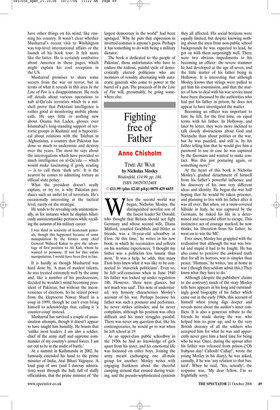Fighting free of Father
Anne Chisholm
TIME AT WAR by Nicholas Mosley Weidenfeld, £14.99, pp. 180, ISBN 10029785240X ✆ £11.99 (plus £2.45 p&p) 0870 429 6655 When the second world war began, Nicholas Mosley, the distinguished novelist son of the fascist leader Sir Oswald, who thought that Britain should not fight Germany and whose second wife, Diana Mitford, counted Goebbels and Hitler as friends, was a 16-year-old schoolboy at Eton. ‘At this time,’ he writes in his new book, in which he reconsiders and reflects on his wartime experiences, ‘I thought my father was a politician less lunatic than most.’ It was a help, he adds, that many Eton boys knew what it was like to be connected to ‘maverick politicians’. Even so, he felt self-conscious when in June 1940 his father was locked up under regulation 18b. However, ‘there were glances, but not much was said’. This note of understated, wry honesty characterises Mosley’s account of his war. Perhaps because his father was such a posturer and performer, he never strikes attitudes; and he never complains, although his position was often difficult and his inner struggles painful. There was never any question that, like his contemporaries, he would go to war when he left school at 19.
As an upper-class public schoolboy in the 1930s he had no knowledge of girls apart from his sister, and his emotional life was focussed on other boys. Joining the army meant exchanging one all-male group for another: Mosley writes with engaging frankness about the cheerful camping around that ensued during training, and the pseudo-sophisticated cynicism they all affected. His social horizons were equally limited, but despite knowing nothing about the men from non-public school backgrounds he was expected to lead, he got on with them surprisingly well. There were two obvious impediments to his becoming an officer: the severe stammer he had developed at the age of seven, and the little matter of his father being in Holloway. It is interesting that although Mosley knows that strings were pulled to get him his commission, and that the matter of how to deal with his war service must have been discussed by the authorities who had put his father in prison, he does not appear to have investigated the matter.
Becoming an officer was important to him: he felt, for the first time, on equal terms with his father. In Holloway, and later by letter, they were more inclined to talk cloudy abstractions about God and Nietzsche than about politics or the war, but he was puzzled, and still is, by his father telling him that he would give him a password to use in case he was captured by the Germans and wanted to make contact. Was this just posturing again, or something more?
At the heart of this book is Nicholas Mosley’s gradual detachment of himself from his father’s powerful influence and his discovery of his own very different ideas and identity. He began the war half hoping that he would be taken prisoner, and planning to live with his father after it was all over. But when, on a snow-covered hillside in Italy, he was captured by the Germans, he risked his life in a determined and successful effort to escape. This instinctive act of courage marked, he now thinks, his liberation from his father; he went on to win the MC.
Ever since, Mosley has grappled with the realisation that although the war was brutal and stupid it had to be fought. He has also come to perceive the awkward truth that for all its horrors, war is simpler than peace. ‘Humans,’ he writes, ‘are at home in war ( though they seldom admit this.) They know what they have to do.’ Although (despite the publishers’ claims to the contrary) much of the story Mosley tells here appears in his long and outstandingly good biography of his father which came out in the early 1980s, this account of himself when young digs deeper and reveals more about the author’s inner conflicts. It is also a generous tribute to the friends he made during the war, who helped him to grow up, and to the very British decency of all the soldiers who accepted him for what he was and apparently never gave him a hard time for being who he was. Once, during the uproar after his father was released from prison (‘Oh frabjous day! Callooh! Callay!’, wrote the young Mosley in his diary), he was asked, casually, if he was ‘any relation to that bastard’. When he said, ‘Yes, actually’, the response was, ‘My dear fellow, I’m so frightfully sorry.’


































































































 Previous page
Previous page